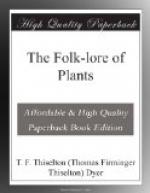A name for the shepherd’s purse is “mother’s-heart,” and in the eastern Border district, says Johnston, children have a sort of game with the seed-pouch. They hold it out to their companions, inviting them to “take a haud o’ that.” It immediately cracks, and then follows a triumphant shout, “You’ve broken your mother’s heart.” In Northamptonshire, children pick the leaves of the herb called pick-folly, one by one, repeating each time the words, “Rich man, poor man, beggar-man, thief,” &c., fancying that the one which comes to be named at the last plucking will prove the conditions of their future partners. Variations of this custom exist elsewhere, and a correspondent of “Science Gossip” (1876, xi. 94). writes:—“I remember when at school at Birmingham that my playmates manifested a very great repugnance to this plant. Very few of them would touch it, and it was known to us by the two bad names, “haughty-man’s plaything,” and “pick your mother’s heart out.” In Hanover, as well as in the Swiss canton of St. Gall, the same plant is offered to uninitiated persons with a request to pluck one of the pods. Should he do so the others exclaim, “You have stolen a purse of gold from your father and mother."” “It is interesting to find,” writes Mr. Britten in the “Folk-lore Record” (i. 159), “that a common tropical weed, Ageratum conyzoides, is employed by children in Venezuela in a very similar manner.”
The compilers of the “Dictionary of Plant Names” consider that the double (garden) form of Saxifraga granulata, designated “pretty maids,” may be referred to in the old nursery rhyme:—
“Mary, Mary, quite contrary,
How does your garden grow?
Cockle-shells, and silver bells,
And pretty maids all in a
row.”
The old-man’s-beard (Clematis vitalba) is in many places popularly known as smoke-wood, because “our village-boys smoke pieces of the wood as they do of rattan cane; hence, it is sometimes called smoke-wood, and smoking-cane.” [6]
The children of Galloway play at hide-and-seek with a little black-topped flower which is known by them as the Davie-drap, meantime repeating the following rhyme:—
“Within the bounds of this I hap
My black and bonnie Davie-drap:
Wha is he, the cunning ane,
To me my Davie-drap will fin’?”
This plant, it has been suggested, [7] being the cuckoo grass (Luzula campestris), which so often figures in children’s games and rhymes.
Once more, there are numerous games played by children in which certain flowers are introduced, as in the following, known as “the three flowers,” played in Scotland, and thus described in Chambers’s “Popular Rhymes,” p. 127:—“A group of lads and lasses being assembled round the fire, two leave the party and consult together as to the names of three others, young men or girls, whom they designate as the red rose, the pink, and the gillyflower. The two young men then return, and having selected a member of the fairer group, they say to her:—




